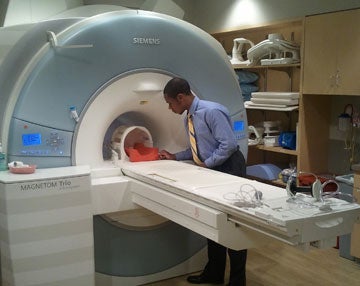News & Highlights
Topics: Diversity & Inclusion, Education & Training, Mentoring
Mentoring a Diverse New Generation of Researchers
Programs for college and medical students have been in full swing this summer.

One way to ensure that Harvard Medical School attracts a spectrum of the best and brightest minds is to invest in “pipeline” programs that provide underrepresented minority students with early exposure to careers in academic medicine. Two such programs for college and medical students have been in full swing this summer at HMS—the Summer Clinical and Translational Research Program (SCTRP) and the Visiting Research Internship Program (VRIP).
Both programs capitalize on the power of strong mentor–trainee relationships to provide students with hands-on experience and an inside look at careers in clinical and translational research. Alex Lin, an HMS instructor in radiology at Brigham and Women’s Hospital, has served as a research mentor for several years and credits these programs for their success in matching the research interests and personalities of the mentors and mentees.
For example, Lin, whose research utilizes MRI spectroscopy to study brain injury, is serving as a mentor to Malcolm Reid Jr., a premed student at Princeton University with an interest in neuroscience.
Reid has quickly become an integral part of Lin’s team this summer by applying his programming skills to the scientific questions of Lin’s research. Commenting on this collaboration, Lin said, “I think that we’ve both particularly enjoyed exploring the multidisciplinary nature of our research in radiology, where he’s been able to use his programming experience to tackle mathematical post-processing methods, which we use for disease diagnosis across a broad spectrum of neurological disorders such as traumatic brain injury, schizophrenia and multiple sclerosis.”
For Reid, the lessons he has learned from Lin this summer have gone beyond the research laboratory.
For Reid, the lessons he has learned from Lin this summer have gone beyond the research laboratory.
“Dr. Lin has the unique perspective of having worked closely with both physicians and scientists,” he said. “His insight is thus helpful to me in terms of my career choices. He has given me a realistic sense of the science end and has introduced me to physicians who, in turn, have given me a share of life in the clinic. Dr. Lin has also promised to offer me guidance further down the road whenever I may need it. My experience in SCTRP has given me an idea of where I want to go and the tools I need to get there,” said Reid.
Click here to learn more about the SCTRP and VRIP, both funded by Harvard Catalyst and administered through the Office of Diversity, Inclusion and Community Partnership at HMS.

